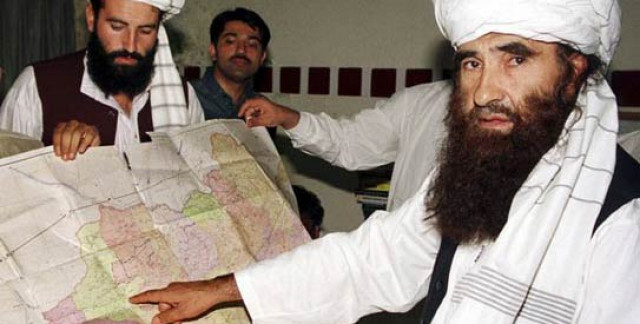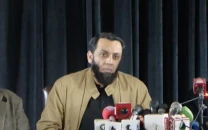Jalaluddin Haqqani died last year after 'prolonged illness': Taliban confirm
Sources say that he was buried in his native Khost province in Afghanistan

Jalaluddin Haqqani had handed over reigns of the network to his son Sirajuddin in 2007. PHOTO: REUTERS
"Jalaluddin Haqqani died nearly one year ago and was buried in an Afghan province near the Pakistani border," the a militant leader close to the network’s supremo said.
An Afghan source added that Jalaluddin was buried in his ancestral graveyard in Khost, Afghanistan. While details on how he died were not disclosed, the source said that he died after a prolonged illness.
Belonging to the Zadran tribe situated along the border with Pakistan in Khost, Jalaluddin was among the pioneers of the resistance against Soviet Union’s occupation of Afghanistan. He was among a group of Afghan leaders who had shifted to Pakistan soon after the empowerment of Sardar Mohammad Daud Khan on July 16, 1975 in Afghanistan.
Read: Afghan Taliban, family officially confirm Mullah Omar's death
After shifting to Pakistan, he established a center for his network, along with a seminary called of Jamia Manbae Uloom in Danday Darpa Khel area of North Waziristan. The seminary became an internationally famous stopover for like minded hardliners and militants from all over the world, including the likes of al Qaeda chief Osama bin Laden.
After the end of the war with the Soviet Union and the collapse of Dr Najibullah’s government in April 1992, Jalaluddin took charge as minister for tribal affairs under the Professor Mujaddadi and Professor Burhanuddin Rabbani governments.
Among them, however, he was the first to switch over to Taliban when they captured Kabul on September 26, 1996.
Read: Senior Haqqani Network leader killed near Islamabad
Jalaluddin then became a member of Taliban Shura (consultation body) and was given a ministry in the setup.
When the Taliban government was ousted as America invaded Afghanistan after the 9/11 tragedy, Jalaluddin established the cross-border group of Haqqani network, calling for a resistance against the US-led allied NATO troops and President Hamid Karzai’s government.
However, owing to his advanced age and onset of paralysis, he handed over reigns of the network to his son Sirajuddin in 2007.
In recent years, the once powerful chief of his network lost his three of his seven sons to US drone attacks, including Badaruddin, Mohammad and Ibrahim Haqqani.
Read: High-profile assassination: Haqqani Network key leader slain near Islamabad
Naseer Haqqani was gunned down in a targeted attack in Islamabad last year. Another of Jalaluddin’s sons, Khalil Haqqani, is currently imprisoned on charges of assisting and facilitating terrorists in an attack on former president and military ruler General (retd) Pervez Musharraf.
Further, his son Anas Haqqani was arrested in Qatar and later airlifted into Kabul. He is currently believed to be in a Kabul prison.
Amid conflicting reports, family members deny Jalaluddin dead
Family members of Haqqani network supremo on Friday denied reports that Jalaluddin had died last year.
Believed to be in his 70s, Jalaluddin is reported to have been in ill health in recent years and has given up most of the day-to-day control of his Taliban and al-Qaeda-allied militant network to his son, Sirajuddin.
However, after reports surfaced that the senior Haqqani had not only died, but had also been buried in his native Khost province, two family members insisted that the militant network’s chief was not dead.
"Maulvi Jalaluddin Haqqani, no doubt, has become aged and suffering from different diseases but by the grace of Allah, he is safe and sound and alive," a close family member said.
However, a third member of the family said the reports were true.
Haqqani "died of a brain haemorrhage a year and half ago. He is buried in the Zadran area of Khost province," this person told Reuters.
The contradictory reports come a day after the Taliban confirmed that its founder Mullah Mohammed Omar had some time ago, signifying a major shift in Afghanistan's militant leadership. The Afghan government said he died in 2013.
Mullah Omar's replacement, Mullah Akhtar Mohammed Mansour, appointed Sirajuddin Haqqani as his deputy, underscoring the links between the Afghan insurgency and the Haqqani network.
The Haqqanis have been blamed for some of the most spectacular attacks against American targets in Afghanistan, a raid on Kabul's top hotel, an assassination attempt on then-President Hamid Karzai and a suicide bombing at the Indian Embassy.



















COMMENTS
Comments are moderated and generally will be posted if they are on-topic and not abusive.
For more information, please see our Comments FAQ